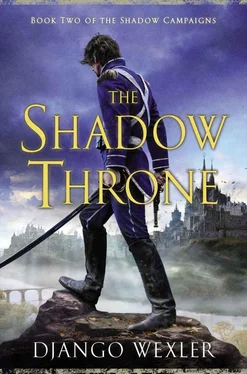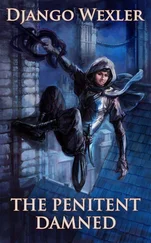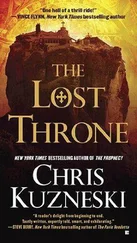Django Wexler - The Shadow Throne
Здесь есть возможность читать онлайн «Django Wexler - The Shadow Throne» весь текст электронной книги совершенно бесплатно (целиком полную версию без сокращений). В некоторых случаях можно слушать аудио, скачать через торрент в формате fb2 и присутствует краткое содержание. Жанр: Фэнтези, на английском языке. Описание произведения, (предисловие) а так же отзывы посетителей доступны на портале библиотеки ЛибКат.
- Название:The Shadow Throne
- Автор:
- Жанр:
- Год:неизвестен
- ISBN:нет данных
- Рейтинг книги:4 / 5. Голосов: 1
-
Избранное:Добавить в избранное
- Отзывы:
-
Ваша оценка:
- 80
- 1
- 2
- 3
- 4
- 5
The Shadow Throne: краткое содержание, описание и аннотация
Предлагаем к чтению аннотацию, описание, краткое содержание или предисловие (зависит от того, что написал сам автор книги «The Shadow Throne»). Если вы не нашли необходимую информацию о книге — напишите в комментариях, мы постараемся отыскать её.
The Shadow Throne — читать онлайн бесплатно полную книгу (весь текст) целиком
Ниже представлен текст книги, разбитый по страницам. Система сохранения места последней прочитанной страницы, позволяет с удобством читать онлайн бесплатно книгу «The Shadow Throne», без необходимости каждый раз заново искать на чём Вы остановились. Поставьте закладку, и сможете в любой момент перейти на страницу, на которой закончили чтение.
Интервал:
Закладка:
In the center of the ring was Count Torahn, dismounted and standing by a folding table covered in maps. With him were several other officers Orlanko didn’t recognize. The Concordat kept files on every military man of any consequence, but Orlanko didn’t concern himself with any not likely to turn up at court. It probably didn’t matter. The Midvale garrison was not considered a promising post in the army, and thus the men assigned to command it were likely to be nonentities.
He waited to get down until one of his men had placed the stepladder so he could descend without an undignified jump. Torahn and the military men looked at him coldly, as though he were something slimy that insisted on worming its way across the lawn instead of rotting quietly under a rock. And, in truth, Orlanko felt uncomfortable, here in the open, under the eyes of these big, haughty men with their gleaming spurs. He had always preferred to employ the small, quick, and clever. But desperate times demand desperate measures, I suppose.
“Your Grace,” Count Torahn said. “I am pleased to see you unharmed. When we got no news from the palace, we feared the worst.”
“Not the worst, thankfully, but bad enough,” Orlanko said. “The city is in open rebellion, thanks to the traitor Vhalnich.”
The colonels made noises of consternation, but Torahn cut them off with a gesture.
“The queen?” he said.
“A prisoner,” Orlanko said. “She will be well treated, I think. The rebels claim to fight in her name. They need her to awe the common people.”
Torahn frowned. “I hope they don’t think to hold her hostage.”
“I have a hard time believing any Vordanai would do such a thing,” Orlanko said. “Rebels or not.”
“True.” Torahn glared at the three colonels. “In spite of my orders, it appears that preparations here have not yet been completed. It will be a day or two before we’re ready to march, I’m told.”
“The sooner the better,” Orlanko said. “Every moment the rebels have to dig in works against us.”
An icy look passed between Orlanko and the Minister of War. It was uncertain who ought to be giving the orders-as a duke, Orlanko had the advantage of rank, but the Ministry of War took precedence over Information, especially in a situation like this one. For the moment, neither chose to make an issue of it.
Orlanko turned to the three colonels. “Gentlemen. I have written a short statement, which I would like your officers to read to the men.” He took a sheet of folded paper from his pocket and tossed it on the table. “In addition, I want to make sure every man in your regiments is impressed with both the importance of this operation and its legitimacy. Whatever their claims, the rebels have imprisoned our queen and taken illegal possession of the seat of Her Majesty’s government. I want no wavering or vacillation when the time comes to confront the traitors!”
All three saluted and barked out assurances of their loyalty, but Orlanko was no longer listening.
If we can recapture Raesinia, he thought , and clear Ohnlei of traitors, then we can reestablish order in the city. He would need to apply the whip with a firm hand, especially in the seditious districts south of the river and by the University. The mob thinks it has nothing to fear from Concordat. It must be taught otherwise. He wondered what had happened to Andreas, and hoped he hadn’t been killed. His talent for bloodshed would be useful in the days to come.
Most of all, though, it all had to happen soon . Too long, and the Borels might start to wonder if their loans would be repaid. Too long, and the Pontifex of the Black would act, and what form that action would take Orlanko hardly dared to imagine. Time, time, all I need is time. A few days, a few weeks, and the rebellion would be crushed. The queen would be taught proper obedience.
And Janus bet Vhalnich will be dying a slow, painful death.
CHAPTER NINETEEN
WINTER
Eight fresh bodies hung in front of the cathedral, roped by the neck and suspended from the rooftop crenellations. Four of them were Borelgai, three men still in their long fur capes and a woman in the shredded remains of an elegant dress. The other four, two men and two women, wore the drab clothes of Vordanai commoners. More Concordat, Winter supposed. The city seethed against the minions of the Last Duke, and more people were imprisoned as Concordat agents every day, on increasingly flimsy pretexts.
Armed men flanked the main entrance in the sashes of the Patriot Guard, Greens on the left and Reds on the right, regarding each other with mutually hostile stares. Winter, wrapped in the plain black sash of a deputy, was admitted after only a cursory inspection.
Inside, shouts and occasional bursts of violent applause indicated the Deputies-General was already in session. The entrance hall was crowded, deputies in their sashes mixing with spectators and supplicants. More Patriot Guards lined the walls, and another pair-one Green and one Red, of course-guarded the double doors leading into the great hall itself. Winter threaded her way through the crowd and, under the cover of a particularly loud burst of shouting, pushed the doors open and slipped inside.
The great hall of the cathedral was not really very well suited to be used for an assembly like this one. It was long and rectangular, arranged so that a single priest could stand at the altar at one end and look out over the rows of worshippers. At first the deputies had planned to put their speaker’s rostrum in front of the altar, but some of the radicals had objected to the way this separated the speaker from the rest of the body-and thus, symbolically, from the body politic, beginning the process that could only end in the exaltation of an individual over the community-
And so on. In the end, in a pattern Winter was beginning to recognize, a compromise was reached that was clearly inefficient and pleased no one. Wooden bleachers were erected along one long edge of the rectangle, displacing various Sworn Church paraphernalia. The benches curved around when they reached the far end of the room, thus cutting off the altar from sight. The speaker was placed against the other long wall, a curiously lopsided arrangement that left him only a short distance from some of his audience and a long way from others. But he was very definitely below them, and in any case by the time the seats had actually been built it was too late to go back and redo everything.
In front of the altar, on the far right of the speaker’s rostrum, the curved section of seats called the Bend was occupied by the Monarchists. They consisted of Peddoc and his ilk, offspring of powerful noble families, backed up by representatives of the larger merchants, Vordanai bankers, and other wealthy men. Opposite them, on the extreme left-hand side of the benches, were the Radicals, now a haphazard coalition of student revolutionaries, lowborn advocates of violent reform, and a few noble sons who had come under the seductive spell of Voulenne. Directly in front of the speaker was a large group variously called the Conservatives (by the Radicals), the Republicans (by the Monarchists), or simply the Center. This was not a cohesive group, but merely a collection of those who for whatever reason felt uncomfortable joining one extreme or the other, and was itself separated into subgroups based on class, shared interest, or simple association or friendship. Winter’s own spot was with Cyte, Cora, and a few of Cyte’s student friends who hadn’t joined the Radicals.
Why she should be a deputy at all was something Winter had often wondered. The grounds for membership were poorly defined. Everyone who had been present on the day of Danton’s assassination was invited, and a few more representatives had forced their way in by virtue of money or influence. Winter was theoretically there to represent Jane and the Leatherbacks, but Jane had given her no advice about what she was supposed to be doing.
Читать дальшеИнтервал:
Закладка:
Похожие книги на «The Shadow Throne»
Представляем Вашему вниманию похожие книги на «The Shadow Throne» списком для выбора. Мы отобрали схожую по названию и смыслу литературу в надежде предоставить читателям больше вариантов отыскать новые, интересные, ещё непрочитанные произведения.
Обсуждение, отзывы о книге «The Shadow Throne» и просто собственные мнения читателей. Оставьте ваши комментарии, напишите, что Вы думаете о произведении, его смысле или главных героях. Укажите что конкретно понравилось, а что нет, и почему Вы так считаете.












